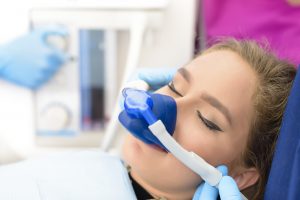Dental Nitrous Oxide Sedation in Davie, FL
**Please note we may not offer this service at Davie Advanced Dentistry. Contact our Davie, FL, office to learn more.
Feel Comfortable at the Dentist’s Office: Overcoming Dental Anxiety

At Davie Advanced Dentistry, our dentist offers nitrous oxide dental sedation to ensure you feel comfortable during your treatments. Contact our Davie, FL dental office today at (954) 434-3331 to schedule an appointment with Dr. Abbo.
What Is Nitrous Oxide?
Nitrous oxide, or laughing gas, is a colorless, odorless gas with mild sedative and analgesic properties. Nitrous oxide slows down the nervous system, making the individual feel less inhibited and ultimately calm and comfortable during the procedure. When administered by a trained professional, it’s inhaled through a mask and quickly absorbed into the bloodstream, offering relaxation and comfort without putting the patient to sleep.
Why Nitrous Oxide Is Used in Dentistry
There are many different scenarios where our dentist may recommend using nitrous oxide as your dental appointment, including:
- Dental Anxiety and Fear: For those who experience dental phobia, nitrous oxide can be a lifesaver, transforming the chair into a more comfortable and less daunting place.
- Pain Management: Nitrous oxide is an excellent choice for enhancing pain control during various dental treatments.
- Patient Cooperation, Especially in Pediatric Dentistry: Children can also benefit from nitrous oxide, as it eases their anxiety and enhances their willingness to cooperate with dental procedures.
- Enhancing Overall Comfort During Treatment: Even for routine check-ups and cleanings, nitrous oxide can provide an extra layer of comfort.
- Conscious Sedation in Minor Oral Surgical Procedures: Nitrous oxide is widely used for conscious sedation, making minor oral surgeries safer and more comfortable. It has a long history of acceptance in dentistry, though it is important to consider its indications, contraindications, and potential neurotoxic effects in certain populations.
- Positioning During Dental Anesthesia: During dental anesthesia, patients are typically reclined in a seated position. Nitrous oxide is often used in this context to ensure patient comfort and cooperation.
Nitrous Oxide Benefits

- Rapid Onset and Recovery: Unlike some other sedation methods, nitrous oxide takes effect swiftly, allowing for a quicker start to the procedure and a shorter recovery time afterward.
- Adjustable Sedation Levels: Administration is highly customizable. The dentist can fine-tune the level of sedation to meet the specific needs and comfort level of the patient.
- Minimal Side Effects: While there are potential side effects, they’re generally mild and short-lived, making it a relatively safe option.
- Suitable for a Wide Range of Patients: It can be used for both children and adults, making it versatile and accommodating for various dental needs.
Additionally, anesthesia machines have safety mechanisms to restrict the lower limit of oxygen delivery to 21% when using anesthetic gases.
Administering Nitrous Oxide for Conscious Sedation
When it comes to the day of your dental procedure with nitrous oxide, you can expect the following:
- Patient Preparation: You’ll be instructed to breathe normally through your nose if a nasal hood is used or through a mask covering both nose and mouth.
- Initial Oxygen: Before introducing nitrous oxide, we’ll administer pure oxygen for a few minutes to ensure the patient has an adequate level of oxygen saturation in their bloodstream.
- Nitrous Oxide Administration: Nitrous oxide is then mixed with oxygen at a controlled ratio and delivered to the patient. The concentration of nitrous oxide can be adjusted as needed to achieve the desired level of sedation.
- Monitoring: Throughout the procedure, your vital signs, such as heart rate, blood pressure, and oxygen saturation, will be continuously monitored to ensure safety.
- Procedure: We’ll proceed with the procedure while you remain relaxed and sedated due to receiving nitrous oxide. You may still be conscious and able to communicate during this time.
- Recovery: After the procedure is complete, the administration of nitrous oxide is stopped, and you’re given pure oxygen for a few minutes to flush out any remaining nitrous oxide from your system. This helps you return to a normal state of consciousness.
- Post-Procedure Monitoring: You’ll be closely monitored as you recover from the effects of the sedation. Once you’re fully alert and their vital signs are stable, you’ll be discharged or moved to a recovery area if necessary.
Potential Risks and Side Effects

- Nausea or Vomiting: Some patients may experience mild nausea or vomiting during or after administration.
- Headache: A mild headache is another possible side effect, although it’s usually short-lived.
- Allergic Reactions: Though rare, allergic reactions can occur. Dental professionals are trained to recognize and address such situations.
- Oxygen Desaturation: In extremely rare cases, nitrous oxide can cause a decrease in oxygen levels. Proper monitoring and equipment calibration minimize this risk.
Additionally, studies have indicated that female dental assistants may face an increased risk of spontaneous abortion due to occupational exposure to nitrous oxide.
Nitrous Oxide Costs
Patients can expect to spend between $25 to $100 or more per session with nitrous oxide. This cost may be included in the overall cost of the dental treatment or billed separately, depending on the dental office’s policies.
The cost of nitrous oxide may be covered by dental insurance in some cases, especially if it’s used for a medically necessary procedure. However, coverage and reimbursement policies vary widely among insurance providers, so patients should check with their insurance company to determine if nitrous oxide is covered and to what extent.
